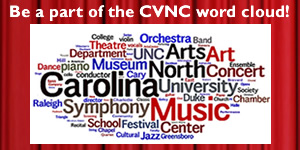In The Wasteland T.S. Eliot speaks of April as “stirring dull roots with spring rain.” Then the flowers, the grand weather and tax deadlines generally follow. Anything else one might note about April? Oh, yes of course, it’s also the time for the annual trek by conductor Nathan Leaf and the choirs of North Carolina State University to Holy Trinity Evangelical Lutheran Church. A near capacity crowd in that smart sanctuary heartily welcomed these performers to their veritable home away from home.
Of the three choirs participating, The Singing Statesmen endeared themselves to the crowd early by opening with the marvelous “Homeland.” Though the piece was credited to J. Randall Stroope, it was readily recognizable as an arrangement from the Jupiter section of The Planets by Holst. With significant support from accompanist John Noel, the group produced a fine reading of this super-fine choral work. The arranger has improved the original lines, providing an especially heart-tugging text. “I vow to you, my country … the service of my love.” The ending couplet implores, “My homeland be my dreams, my hope. Homeland, homeland! Home.”
Among several other numbers, these Statesmen excelled with Schubert’s “Die Nacht,” (extolling the grandeur of the night) with the tenors soaring nicely in a cappella mode. They did excellent work on Gwyneth Walker’s modern setting of the Tennyson poem, “Crossing the Bar.” Crowd pleasers were spirituals and a set of traditional men’s songs.
Not to be upstaged by the men, the Vox Accalia women’s chorus demonstrated their versatility with a choreographed, light-hearted “Bring Me a Little Water Silvy.” They proceeded in fine manner to “make a joyful noise” with “Sing a New Song to the Lord.” Here Noel’s piano accompaniment was powerfully enhanced by student Margaret Rahmoller’s oboe. Their work (along with the vital accompaniment) was first rate on the upbeat “Father William” from Three Choruses from Alice in Wonderland by Irving Fine. They asserted their enduring qualities, providing hand percussion with the spiritual, “Ain’t No Grave Can Hold My Body Down.”
After an intermission The NC State Chorale, a large mixed chorus, brought on a serious mood with Ernani Aguilar’s contemporary setting of Psalm 150. They then reverted a couple of centuries in style with a precise treatment of Charles Villiers Stanford’s “Justorum animae” (The souls of the just are in the hands of God). They reprised an earlier mood of patriotism with yet another version of “homeland,” supported by longtime accompanist Tom Koch. Here they furnished the requisite complex harmonies and structures doing justice to the Brahms “An Die Heimat” (To My Homeland). “Homeland! Return to me the peace that I lost in faraway places.”
Having dispatched the sopranos to the balcony and the rest over into a corner, Leaf pointed out that “O Adonai, et Dux domus Israel” (O Lord, leader of the house of Israel) by Roderick Williams was meant to be quite free-form (even a bit experimental?). A bit startling at times, it was not without its moments of beauty and drama. Chorus member Christopher Nowlan offered a properly dignified baritone solo. The group presented three numbers from Shakespeare Songs, Book IV by Matthew Harris. These a cappella pieces were of tight, formal structure, allowing the basses to shine with a luster. With student accompanist Megan Hood, they asked, “Am I Born to Die?” (by Dwight Bigler from Virginia Tech), and they declared, along with arranger Moses Hogan, that “We Shall Walk Through the Valley in Peace,” the most sober (and possibly the most pleasing) spiritual anyone has ever heard.
Here on an exquisite evening, three excellent choirs have favored an appreciative audience with no fewer than twenty-five well-crafted choral works. So this discussion cannot adequately capture the true spirit. You just needed to be there.











